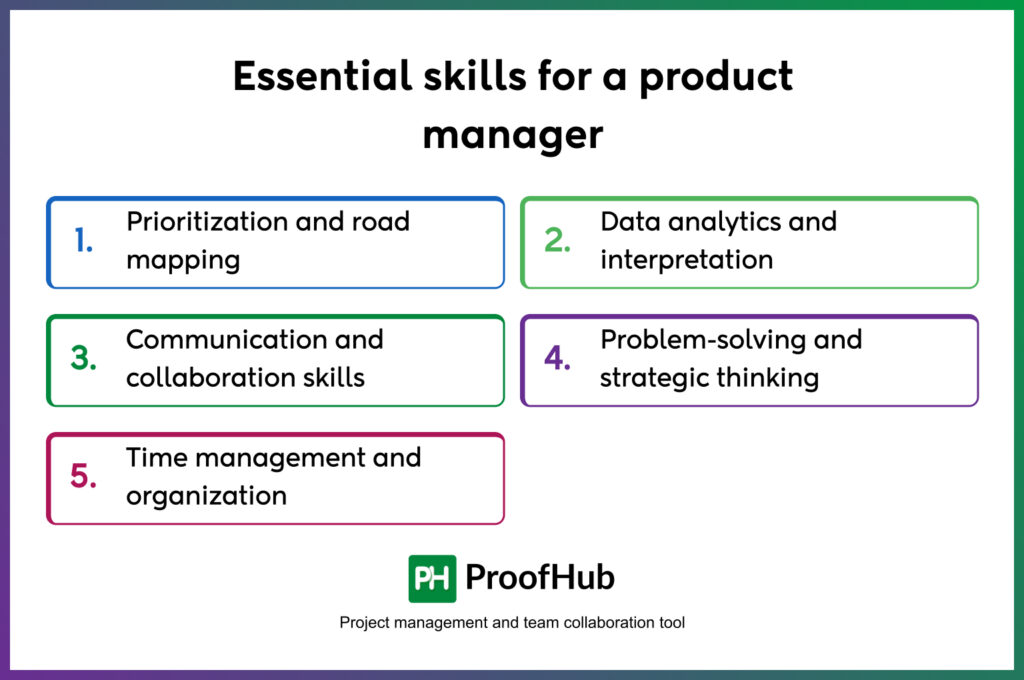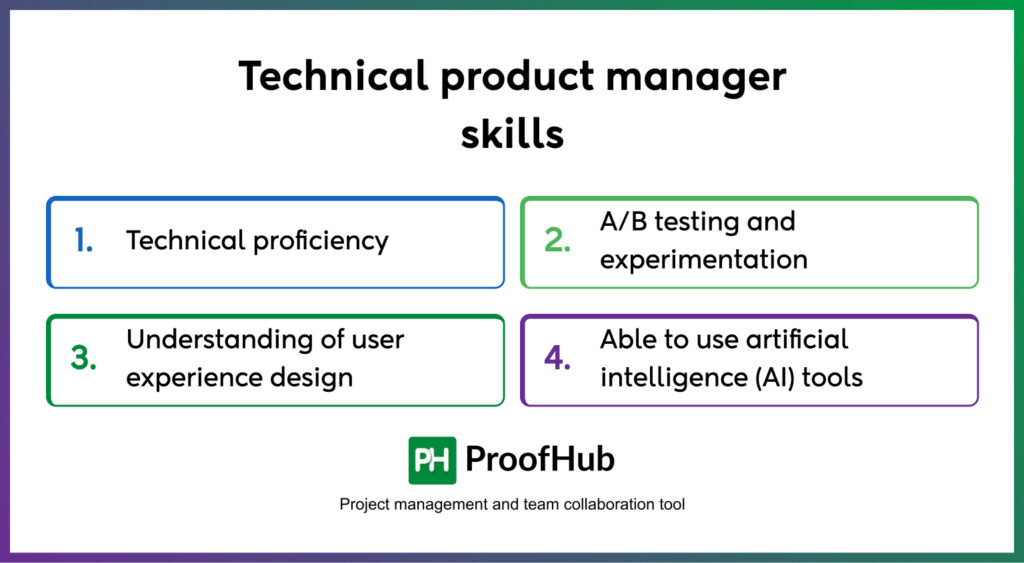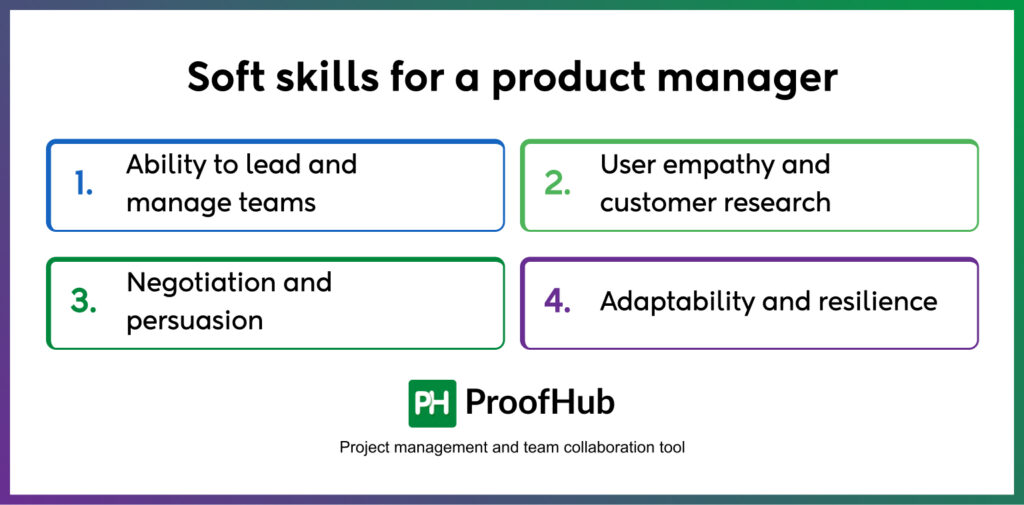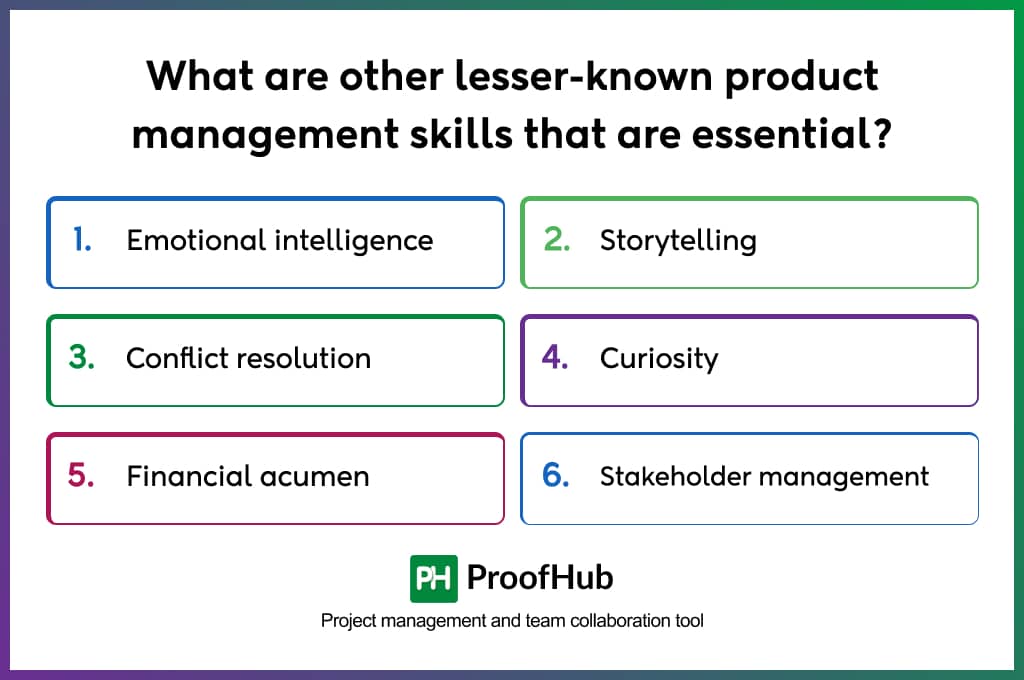Product management skills are crucial for delivering products that meet user needs and drive business growth.
They enable product managers to prioritize tasks, make data-driven decisions, and lead cross-functional teams effectively.
“A great product manager has the brain of an engineer, the heart of a designer, and the speech of a diplomat.” – Deep Nishar, former VP of product and user experience at LinkedIn.
This article covers the most essential, technical, soft, and lesser-known skills required for product managers. It also explains why these skills are important for business and how to develop them.
What does a product manager do?
A product manager oversees the development, launch, and continuous improvement of a product or product line.
They align business objectives, customer needs, and technical feasibility to deliver valuable products.
A product manager defines the product vision, develops a roadmap, prioritizes key features, and coordinates cross-functional teams.
What are the top skills a product manager requires?
A product manager requires various skills depending on the industry, company, and product.
However, we will categorize key skills for a product manager into three categories: essential, technical, and soft skills.
Now, let’s learn about all the important skills you’ll need to become a great product manager.
Essential skills for a product manager

Essential skills help you manage resources, identify and solve problems, meet deadlines, and create products that meet user needs.
1. Prioritization and road mapping
“As all entrepreneurs know, you live and die by your ability to prioritize. You must focus on the most important, mission-critical tasks each day and night, and then share, delegate, delay or skip the rest.” – Jessica Jackley
As a product manager, you’ll receive a lot of different ideas, requests, and suggestions from different angles.
You also have to make sure that everyone is working on the right things at the right time and meeting goals and deadlines.
You need to prioritize everything based on user needs, business goals, and technical feasibility.
This means that you should be able to identify the most critical tasks that need to be done first. Then, you can create a technology roadmap that outlines how you plan to get there.
Pro tip: Use a work prioritization tool that lets you have a bird’s-eye view of the team’s progress. It will let you understand better how to allocate resources and to whom.
2. Data analytics and interpretation
As with any role in industry nowadays, product management is also a highly data-driven field. The best product managers can analyze different data types to make informed decisions.
They use data to understand the market and test different versions of a product or feature. Then uncover product issues and measure performance against relevant KPIs.
You don’t have to be an expert data scientist, though. As long as you have a basic understanding of data and know how to gain insights from it, you’ll be well set up for a role in product management.
Pro tip: If you want to learn about data analytics, check out Maven’s article called “The Product Manager’s Guide to Data Analytics“.
This article covers best practices and real-life examples for using data in your product management process.
3. Communication and collaboration skills
“Nothing in life is more important than the ability to communicate effectively.” – Gerald R. Ford, former United States president.
And as a product manager, you just can’t forget to develop communication and collaboration skills.
You’ll be working with various teams, including designers, developers, sales, marketing, and customer service. You’ll be the one responsible for aligning these teams and making sure everything is going smoothly.
Every day, you’ll answer questions, facilitate meetings, have catch-ups, or present to stakeholders.
It’s crucial to have excellent communication skills, including being an active listener and using your skills with confidence and empathy.
Pro tip: Practice active listening by giving your full attention to others and making an effort to understand their perspective.
Try to step out of your comfort zone and engage with people from different backgrounds and experiences. This will help broaden your communication skills and build stronger relationships.
4. Problem-solving and strategic thinking
“All things aside, there is one role that all product managers play, and that is of a problem solver. That’s what the product manager role is all about – finding out problems, figuring out the best ways to solve them, and increasing the business value in the process.” – Josh Fechter, CEO and Co-founder of Squibler
Problem-solving and strategic thinking skills also come in handy for internal operations. You find ways to improve internal processes and overcome challenges with limited resources.
This mindset is crucial throughout the product lifecycle and for managing internal operations.
Luckily, problem-solving is a skill that can be applied in various contexts, and you may already have experience with it.
Pro tip: You should approach a problem from different angles and consider various solutions. This will help you identify potential issues or roadblocks and let you come up with creative solutions.
You can also gather input from others, such as team members or stakeholders, to better understand the problem and potential solutions.
5. Time management and organization
One area where strong organizational skills and time management abilities are particularly important is product management.
As a product manager, you have to coordinate with multiple teams, including engineering, design, marketing, and sales. You need to ensure that everything is on track and that the product will be delivered on time.
This helps prevent delays or miscommunications, which can ultimately lead to a more successful product launch.
Pro tip: Create a prioritized to-do list. Start your day by listing all the tasks that need to be accomplished and then prioritizing them based on their importance and deadline.
This will help you focus on the most critical tasks and prevent you from getting distracted by less important ones.
Technical product manager skills

Technical skills help you make informed decisions based on data, design, and optimize product features.
You can use AI/ML tools to enhance product performance and user experience.
6. Technical proficiency
Product managers don’t need to know how to code. However, it’s important to have a good understanding of the technical side of the product development process.
You will work closely with developers to make sure that the product is built and tested according to your specifications. Therefore, it is necessary to learn the technical product manager skills.
This will help you understand the basics of the project management process and the technology behind your product.
Speaking the same language as developers will help you collaborate better with engineering teams, which is a crucial aspect of the product manager role.
Pro tip: You should attend technical meetings with developers to understand the product. Ask your queries and clear your doubts regarding any technical detail you need help understanding.
This will help you learn more about the technical specifications and requirements of your product.
7. A/B testing and experimentation
The ability to design and execute A/B tests can help you make data-driven decisions about product features and improve overall performance.
You can identify which features resonate best with your users and optimize your product accordingly.
Pro tip: You can find lots of resources online to learn about A/B testing. Check out this blog on “A complete guide to A/B testing in product management” by Nulab.
It explains the basics of A/B testing and can help you get started with your first experiment.
8. Understanding of user experience design
As a product manager, it’s your job to create valuable products for the business and end-users.
You work closely with UX designers and researchers to advocate for the user at every stage of the product life cycle.
You don’t have to be a UX expert. But understanding UX principles, best practices, and processes will help you communicate product requirements more effectively with the design team.
Pro tip: You can start by reading and learning from industry experts. Many online free and paid resources can help you build your knowledge in this area.
One of the best resources is Nielsen Norman Group. This website offers a wide range of articles, videos, and training courses on user experience design.
9. Able to use artificial intelligence (AI) tools
A product manager should leverage AI tools for automating data analysis and improving decision-making.
You can apply AI tools to enhance product performance and user insights.
Pro tip: You can develop this skill by taking online courses and certifications that specialize in AI. As a beginner, you can start with the course “AI For Everyone” available on Coursera.
You can also read books to always stay up-to-date with the latest AI trends and best practices to ensure you are using the tools effectively.
Soft skills for a product manager

Soft skills allow a product manager to effectively communicate and collaborate with stakeholders.
These skills let you lead and motivate teams, negotiate with suppliers and vendors, and adapt to changing market conditions.
10. Ability to lead and manage teams
For product managers at all levels, leadership and management skills are vital to support and motivate their team and meet deadlines.
As product managers often lead cross-functional teams, they must get everyone on the same page and work toward the same goal.
Therefore, you need to possess some project management skills to take products from development to launch successfully.
Pro tip: You can start by leading a team in a non-work-related activity, such as organizing a charity event or leading a sports team.
This will allow you to practice your leadership and management skills in a low-stakes environment while helping you develop new skills and perspectives.
Discover the top leadership skills you need to lead your team successfully!
11. User empathy and customer research
If you want to create great products that solve real problems and deliver an outstanding user experience, you need to understand your target audience well.
This requires conducting customer research, analyzing data, and gathering user feedback.
Pro tip: By putting yourself in your customer’s shoes and thinking from their perspective, you can identify pain points and opportunities for improvement.
This way, you can develop a deep understanding of your users’ needs and perspectives.
12. Negotiation and persuasion
When resources and time are tight, you need to justify why your objectives are important. This requires negotiating with others, whether it’s a team member or a superior, to get them on board.
Other than that, there may be a time when you need to negotiate with stakeholders and advocate for your product vision.
This means you should communicate effectively and persuasively to get buy-in from stakeholders.
Pro tip: Try to listen to others so you can better understand their perspective. Then, you can tailor your message to address their concerns.
Also, be confident and be prepared with data and examples. This will help you strengthen your argument and increase your chances of success.
13. Adaptability and resilience
“The most under-appreciated skill is adaptability: The ability to change, to see change, to re-frame, to re-assess.” – Carey Caulfield
Product manager is not a role for people who enjoy doing the same things daily. It requires a lot of mental agility to handle various tasks that come up every day across different domains.
As a product manager, you need to handle ambiguity. You should take time to reflect on your experiences and learn from your mistakes. You need to be flexible enough to pivot your strategy when necessary.
Ultimately, your success as a product manager depends on your ability to navigate complex challenges and deliver a product that meets the needs of your customers while driving business growth.
Pro tip: You should seek out new experiences and challenges. That means you can take on a project outside your comfort zone to improve your skillset.
By combining the above skills, you can effectively lead the development and launch of successful products that meet user needs and drive business growth.
What are other lesser-known product management skills that are essential?

Apart from the well-known skills discussed above, there are some lesser-known skills that no one ever talks about. These skills are also crucial for a product manager’s success.
Let’s discuss those skills, too, so you don’t fall behind.
- Emotional intelligence
Product managers need to be aware of their own emotions and the emotions of others.
Emotional intelligence will help you build strong relationships with team members, customers, and other stakeholders. Additionally, you can effectively handle difficult situations and conflicts.
- Storytelling
“Storytelling is by far the most underrated skill in business.” – Gary Vaynerchuk
But storytelling is another crucial skill that you need to learn. It helps you effectively share the vision and impact of your product or idea with others.
By crafting a compelling story, you can inspire and excite your team, investors, and customers, boosting their engagement and buy-in.
- Conflict resolution
Conflict resolution may not sound glamorous, but it’s quite important for a product manager.
As a conflict resolver, you can handle different opinions of individuals or groups and help them find common ground.
- Curiosity
A curious mind is also a significant skill for product managers. It allows you to ask questions, seek out new information, and explore new ideas.
Curiosity can help you come up with creative solutions and stay on the cutting edge of the industry.
- Financial acumen
To make good decisions about your product, it’s important to understand how they’ll affect your company’s finances.
You should make a business case to explain your plans to others and get the resources you need for your product. This helps you present your ideas clearly and simply, and get the support you need.
- Stakeholder management
A product manager manages the expectations of internal and external stakeholders. They communicate clearly, negotiate priorities, and maintain alignment on objectives.
Also read: Stakeholder analysis: Definition, types, benefits and steps
How to develop the relevant product management skills?
By now, you must have understood that you should have the right skills to succeed as a product manager.
However, it can be challenging to gain and improve all the skills in the product manager skills list.
So, here are some practical tips and resources to help you learn the crucial skills:
1. Opt for online courses and certifications
One of the best ways to gain product manager skills is by taking online courses and certifications.
There are several reputable online platforms, including LinkedIn and Udemy, that offer product management courses to meet various professionals’ needs.
These courses provide a complete understanding of product management, covering areas such as market research, product development, and launch.
Some of the courses or certifications you can consider are:
- Product Management First Steps by LinkedIn
- Product Management A-Z: Excel as a PM & Build great Products by Udemy
- Product Management Course for Beginners by Great Learning Academy
- Product Manager Nanodegree Program by Udacity
2. Read books and articles on product management
Another great way is to read books and articles about product management.
Reading industry-specific literature can help you stay up-to-date on the latest trends and best practices in product management.
You can also learn from the experiences of other professionals who have encountered and solved similar challenges.
Here are some recommendations for you to start with:
- Responsibilities and Best Practices of SaaS Product Manager
- Project Manager and Product Manager — What’s the difference
- The Lean Product Playbook by Dan Olsen
- When Coffee and Kale Compete by Alan Klement
3. Attend industry events and conferences
Conferences are a great opportunity to network with professionals who share similar interests, experiences, and procedural knowledge.
These events also offer a chance to connect with people who may have different perspectives and ideas. It will help you with personal and professional growth.
Additionally, conferences and industry events provide access to the latest information, trends, and best practices.
It will be easier for attendees to stay up-to-date and ahead of the competition in their field.
4. Participate in online communities and forums
You can join online communities related to product management to keep yourself informed about current trends, best practices, and new technologies.
In these communities, you can interact with other professionals in your field, ask and answer questions, share your insights, and gain valuable knowledge and experience.
You can start with these recommended communities:
5. Take on challenging projects at work
If you want to improve your SaaS product manager skills, you need to practice them at your job.
Try taking on challenging projects that require you to use your digital product manager skills.
Look for projects that push you out of your comfort zone so you can learn new things and put them into practice.
6. Volunteer for product management roles in startups
Startups often look for people who can help them develop and manage their products.
If you’re hoping to gain experience and build your software product manager skills, consider volunteering for a product management role in a startup.
You will be able to work closely with the founders and other team members. This will allow you to learn about the entire product development process.
Why are product management skills important for business growth?
Product management skills directly impact business growth by aligning customer needs with company objectives. They ensure products solve real problems, improve user satisfaction, and strengthen product-market fit.
Strong product management leads to better prioritization, faster decision-making, and efficient use of resources. This results in higher adoption rates, competitive advantage, and measurable revenue growth.
What are common challenges product managers face?
- Unclear or constantly changing requirements: Product managers must manage shifting priorities and unclear stakeholder expectations, which complicate planning and execution.
- Cross-functional misalignment: Different teams often have conflicting goals, requiring the product manager to align them toward a shared vision.
- Lack of customer feedback: Insufficient user research or data makes it difficult to validate product decisions and ensure features solve real problems.
- Time and resource constraints: Product managers face limited budgets and tight deadlines, requiring strong prioritization and efficient resource allocation.
- Balancing short-term and long-term goals: They must manage immediate product fixes while ensuring strategic progress toward the overall vision.
What are the top 3 responsibilities of a product manager?
The top three responsibilities of a product manager are as follows:
- Vision and strategy: The first and most important responsibility is to define the project, what it should be, why it is essential, and how it can achieve its goals.
- User advocacy: The product manager should support the needs of customers, ensuring that product features solve real problems and delight users.
- Cross-functional leadership: Another important responsibility is to guide the development, marketing, and sales teams to build, launch, and evolve the product successfully.
What makes a product manager stand out?
A great product manager should showcase exceptional skills and qualities that set them apart. These include a deep understanding of their customers’ needs, a clear product vision, excellent communication skills, a data-driven approach to decision-making, and the ability to work collaboratively with cross-functional teams to achieve business goals.
Why are metrics and KPIs important for product managers?
Product managers rely on metrics and KPIs to evaluate their product’s performance, identify areas for improvement, and make their decisions based on data. This ensures that the product meets the needs of the customers and achieves business goals.
How important is technical proficiency for a product manager?
Technical proficiency is not a strict requirement, but it can help bridge the gap between product managers and developers. It boosts product confidence and leads to smarter decisions. It may not be essential, but it remains a valuable skill.
The final thought
Whether you’re planning to switch to a product management role internally or starting as a junior, take the time to level up your product manager skills. It will give you the edge you need to become a successful and competitive product manager.

